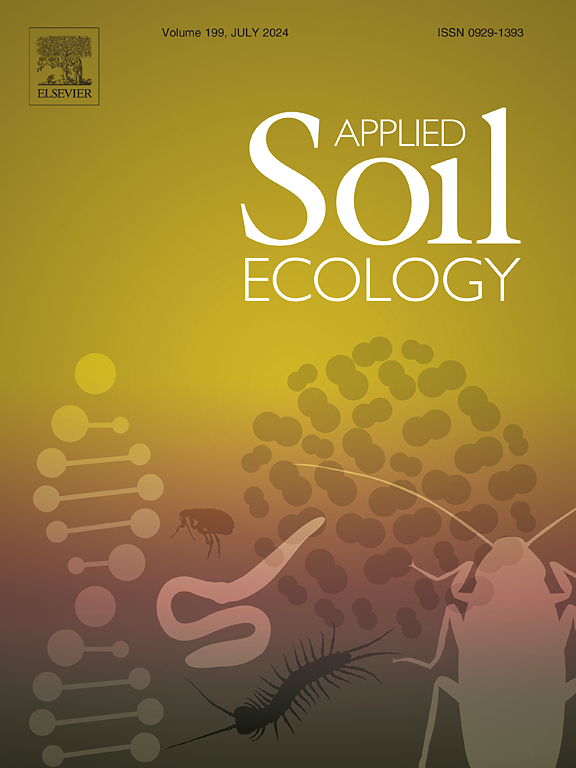热带森林向乔木和油棕种植园转化后土壤-根-生物相互作用的变化
IF 4.8
2区 农林科学
Q1 SOIL SCIENCE
引用次数: 0
摘要
单一栽培对热带生态系统和生物多样性的影响已经得到了广泛的研究,但对土壤、植物根系和生物之间关系的影响却很少受到关注。我们试图评估热带森林向单一栽培转变后土壤-根-生物相互作用的变化。利用印度尼西亚森林和多棵树木和油棕种植园的数据,我们发现森林向单一栽培的转变通过对土壤理化性质、根系分泌物和土壤生物的直接和间接影响来影响土壤生态。土地管理措施和植物生理对不同土地利用类型的土壤理化性质有影响。虽然与植物生长相关的初级代谢物的根渗出物与土壤理化性质密切相关,但土壤理化性质和森林与单一栽培之间潜在的生态差异在决定植物-植物界面(包括竞争和防御病原体)的次生代谢物渗出物方面发挥着重要作用。这表明次生代谢物通过一个复杂的机制进化,包括物理过程和与其他植物的相互作用。尽管单作人工林具有优越的负责竞争的初级和次级代谢物,但其抑制病原菌的防御性代谢物较森林弱。此外,单一栽培土壤微生物剖面中真菌的比例显著高于森林。防御系统的削弱,加上真菌的增加,会增加单一栽培对疾病的易感性。我们的研究结果强调了多样化生态系统在确保生态稳定方面的关键作用,强调了增强单一栽培多样性的必要性,无论是通过农林业还是间作,都有利于长期土壤健康。本文章由计算机程序翻译,如有差异,请以英文原文为准。
Changes in soil-root-organism interactions following tropical forest conversion to tree and oil palm plantations
The impacts of monoculture establishment on tropical ecosystems and biodiversity have been the subject of extensive studies, yet the impact on the relationship between soil, plant root, and organism has received limited attention. We sought to assess changes in soil-root-organism interactions resulting from tropical forest conversion to monocultures. Using data from forests and multiple tree and oil palm plantations in Indonesia, we found that the conversion of forests to monocultures impacted soil ecology through direct and indirect effects on soil physicochemical properties, root exudates, and soil organisms. Land management practices and plant physiology influenced soil physicochemical properties across land use types. While root exudates of primary metabolites associated with plant growth were strongly related to soil physicochemical properties, both soil physicochemical properties and the underlying ecological differences between forests and monocultures play important roles in determining secondary metabolite exudates responsible for plant-plant interface, including competition and defence against pathogens. This demonstrates that secondary metabolites evolve through a complex mechanism involving both physical processes and interactions with other plants. Despite having superior primary and secondary metabolites responsible for competition, monoculture plantations had weaker defensive metabolites for pathogen suppression than forests. Furthermore, monocultures had a significantly higher proportion of fungi in their soil microbial profiles than forests. A weakened defence system, combined with elevated fungal presence, can increase monocultures' susceptibility to disease. Our results underscore the critical role of diverse ecosystems in ensuring ecological stability, emphasising the necessity for enhanced diversity in monocultures, whether through agroforestry or intercropping, for long-term soil health.
求助全文
通过发布文献求助,成功后即可免费获取论文全文。
去求助
来源期刊

Applied Soil Ecology
农林科学-土壤科学
CiteScore
9.70
自引率
4.20%
发文量
363
审稿时长
5.3 months
期刊介绍:
Applied Soil Ecology addresses the role of soil organisms and their interactions in relation to: sustainability and productivity, nutrient cycling and other soil processes, the maintenance of soil functions, the impact of human activities on soil ecosystems and bio(techno)logical control of soil-inhabiting pests, diseases and weeds.
 求助内容:
求助内容: 应助结果提醒方式:
应助结果提醒方式:


